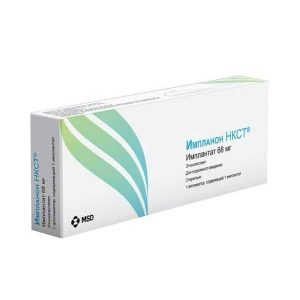Description
Latin name
Yarina
Release form
film-coated tablets.
Packing
In a blister calendar package of 21 pieces. in a pack of 3 packs.
Pharmacological action
Yarina is a low-dose monophasic combined contraceptive with antimineralocorticoid and antiandrogenic properties. It inhibits the secretion of gonadotropic hormones of the pituitary gland, inhibits the maturation of follicles and interferes with the ovulation process. Increases the viscosity of cervical mucus, which makes it difficult for sperm to enter the uterus.
Drospirenone has an antimineralocorticoid effect and is able to prevent weight gain and other symptoms associated with fluid retention in the body. Prevents sodium retention caused by estrogen, provides very good tolerance and has a positive effect on premenstrual syndrome. In combination with ethinyl estradiol, drospirenone improves the lipid profile and increases HDL levels. Drospirenone has anti-androgenic activity and helps to reduce the manifestations of acne and reduce the production of sebaceous glands. Does not counteract the increase in the level of sex hormone binding globulin (SHBG) induced by ethinyl estradiol, which contributes to the binding and inactivation of endogenous androgens.
Drospirenone does not have any androgenic, estrogenic, glucocorticoid and antiglucocorticoid activity, which, in combination with antimineralocorticoid and antiandrogenic effects, provides drospirenone with a biochemical and pharmacological profile that is very close to natural progesterone. There is evidence of a reduced risk of endometrial and ovarian cancer.
With the use of the drug Yarin, the menstrual cycle becomes more regular, less painful menstruation is observed, the intensity of menstrual flow decreases, as a result of which the risk of developing iron deficiency anemia is reduced.
Indications
Hormonal contraception.
The drug is recommended for use with acne and seborrhea, as well as with hormone-dependent fluid retention in the body.
Contraindications
– current or history of thrombosis (venous and arterial) (e.g., deep vein thrombosis, pulmonary embolism, myocardial infarction, until the liver test parameters are normalized)
– the presence at present or in a history of benign or malignant liver tumors
– detected hormone-dependent malignant diseases of the genitals or mammary glands or suspected
– severe or acute renal failure
– vaginal bleeding of unclear – pregnancy or suspected
– lactation (breastfeeding)
– hypersensitivity to the drug.
Use during pregnancy and lactation
The drug is not prescribed during pregnancy and during lactation. If pregnancy is detected while taking Yarina ®, it should be immediately canceled. However, extensive epidemiological studies did not reveal an increased risk of developmental defects in children born to women who received sex hormones before pregnancy or teratogenicity in cases of taking sex hormones through negligence in early pregnancy. At the same time, data on the results of taking the drug Yarina ® during pregnancy are limited, which does not allow us to draw any conclusions about the negative effect of the drug on pregnancy, the health of the newborn and the fetus. Currently, no significant epidemiological data are available.
Taking combined oral contraceptives can reduce the amount of breast milk and change its composition, so their use is not recommended until the termination of breastfeeding. A small amount of sex steroids and / or their metabolites may be excreted in milk.
Composition
1 tablet contains:
active ingredients: drospirenone 3 mg, ethinyl estradiol 0.03 mg
excipients: lactose monohydrate – 48.17 mg corn starch – 14.4 mg corn pregelatinized starch – 9.6 mg povid 4 mg of magnesium stearate – 800 μg of hypromellose (hydroxypropylmethyl cellulose) – 1, 0112 mg macrogol 6000 – 202.4 μg talc (magnesium hydrosilicate) – 202.4 μg titanium dioxide (E171) – 556.5 μg iron (II) oxide (E172) – 27.5 μg
Dosage and administration
Inside, in the order indicated on the package, every day at about the same time, with a little water.
Take one tablet a day continuously for 21 days. Taking tablets from the next pack begins after a 7-day break, during which menstrual bleeding usually develops (withdrawal bleeding). As a rule, it begins on the 2nd 3rd day after taking the last pill and may not end before taking the pill from the new package.
How to start taking Yarina ®
If you are not taking any hormonal contraceptives in the previous month,
Yarina ® begins on the first day of your menstrual cycle (that is, on the first day of your menstrual bleeding). It is allowed to start taking on the 2nd 5th day of the menstrual cycle, but in this case it is recommended to additionally use the barrier method of contraception during the first 7 days of taking the tablets from the first package.
When switching from other combined oral contraceptives, a vaginal ring or contraceptive
, it is preferable to start taking Yarina ® the day after taking the last active pill from the previous package, but in no case later than the next day after the usual 7-day break (for drugs containing 21 tablets) or after taking the last inactive tablet (for preparations containing 28 tablets per pack). Reception of Yarina ® should begin on the day the vaginal ring or patch is removed, but no later than the day when a new ring is to be inserted or a new patch is glued.
When switching from contraceptives containing only progestogens (“mini-drank”, injection forms, implant), or from an intrauterine contraceptive-releasing gestagen (Mirena)
You can switch from mini-pill to Yarina ® any day (without a break), from an implant or an intrauterine contraceptive with gestagen – on the day of its removal, from the injection form – from the day when the next injection should be given. In all cases, it is necessary to use an additional barrier method of contraception during the first 7 days of taking the tablets.
After an abortion in the first trimester of pregnancy
You can start taking the drug immediately, on the day of the abortion. Subject to this condition, a woman does not need additional contraception.
After childbirth or abortion in the second trimester of pregnancy
Start taking the drug should be no earlier than 21-28th day after childbirth (in the absence of breastfeeding) or abortion in the second trimester of pregnancy. If administration is started later, it is necessary to use an additional barrier method of contraception during the first 7 days of taking the tablets. However, if a woman has already had a sexual life, pregnancy should be excluded before the start of taking Yarina ® or it is necessary to wait for the first menstruation.
Taking missed
tablets If the delay in taking the drug was less than 12 hours, contraceptive protection does not decrease. A woman should take the pill as soon as possible, the next one is taken at the usual time.
If the delay in taking the pills was more than 12 hours, contraceptive protection is reduced. The more tablets missed and the closer the pass to the 7-day break in taking the tablets, the greater the likelihood of pregnancy.
In this case, you can be guided by the following two basic rules:
– the drug should never be interrupted for more than 7 days
– to achieve adequate suppression of the hypothalamic-pituitary-ovarian regulation, 7 days of continuous administration of tablets are required.
Accordingly, the following tips can be given if the delay in taking the pills exceeds 12 hours (the interval since taking the last pill is more than 36 hours).
First week of taking
It is necessary to take the last missed pill as soon as possible, as soon as the woman remembers this (even if for this you need to take two tablets at the same time). The next tablet is taken at the usual time. Additionally, a barrier method of contraception (such as a condom) should be used over the next 7 days. If sexual intercourse took place during the week before skipping a pill, it is necessary to consider the likelihood of pregnancy.
Second week of taking
It is necessary to take the last missed pill as soon as possible, as soon as the woman remembers this (even if for this you need to take two tablets at the same time). The next tablet is taken at the usual time. Provided that the woman took the pill correctly within 7 days preceding the first missed pill, there is no need to use additional contraceptive measures. Otherwise, as well as when skipping two or more tablets, it is necessary to additionally use barrier methods of contraception (such as a condom) for 7 days.
Third week of taking
The risk of pregnancy is increasing due to the upcoming break in pills. A woman should strictly adhere to one of the following two options. Moreover, if during the 7 days preceding the first missed tablet, all tablets were taken correctly, there is no need to use additional contraceptive methods.
1. You need to take the last missed pill as soon as possible, as soon as the woman remembers this (even if for this you need to take two tablets at the same time). The following tablets are taken at the usual time until the tablets from the current package run out. Taking tablets from the next pack should start immediately without interruption. Withdrawal bleeding is unlikely until the second pack is over, but spotting and breakthrough bleeding may occur while taking the tablets.
2. You can stop taking pills from the current package, starting in this way a 7-day break (including the day of passing the tablets), and then start taking the tablets from the new package.
If a woman missed taking the pills, and then during the break in the reception she does not have withdrawal bleeding, pregnancy must be excluded.
Recommendations for vomiting and diarrhea
In case of vomiting or diarrhea up to 4 hours after taking the tablets, absorption may not be complete and additional measures should be taken to prevent unwanted pregnancy. In such cases, you should focus on the above recommendations when skipping tablets.
Change the day onset of menstrual bleeding
In order to delay the onset of menstrual bleeding, it is necessary to continue taking tablets from a new package of Yarina ® without a 7-day break. Tablets from a new package can be taken as long as necessary, including until the pills from the package have run out. Against the background of taking the drug from the second package, spotting spotting from the vagina or breakthrough uterine bleeding is possible. Resume taking Yarina ® from the next package after the usual 7-day break.
In order to move the day the menstrual bleeding begins to another day of the week, a woman should shorten the immediate break in taking the pills by as many days as she wants. The shorter the interval, the greater the risk that she will not have withdrawal bleeding, and in the future there will be spotting and breakthrough bleeding during the second pack (as well as in the case when she would like to delay the onset of menstrual bleeding).
Side effects of
The most frequently reported adverse reactions to the drug Yarina are nausea and pain. They were found in more than 6% of women using this drug.
Serious adverse reactions are arterial and venous thromboembolism.
The table below shows the frequency of adverse reactions. reported in clinical trials of the drug Yarina ® (N = 4897). Within each group, selected depending on the frequency of occurrence of an undesirable reaction, undesirable reactions are presented in order of decreasing severity. By frequency they are divided into frequent ( 1/100 and
Table 1
Organ-organ classes (MedDRA version) Often infrequently rare Frequency is unknown
Mental disorders Mood swings, depression, depressed mood, decrease or loss of libido
Nervous system Vascular or Migraine arterial thromboembolism *
gastrointestinal tract Nausea
Skin and subcutaneous tissue erythema multiforme
Reproductive system and mammary glands Pain in the mammary glands, irregular uterine bleeding, bleeding from the polo pathways of unspecified origin Breast hypertrophy Vaginal discharge, mammary discharge
Adverse events during clinical trials were codified using the MedDRA dictionary (Medical Dictionary of Regulatory Activities, version 12.1). Different MedDRA terms reflecting the same symptom have been grouped together and presented as the only adverse reaction to avoid weakening or blurring the true effect.
* – Estimated frequency based on epidemiological studies covering a group of combined oral contraceptives. The frequency was very rare.
– Venous or arterial thromboembolism includes the following nosological units: peripheral deep vein occlusion, thrombosis and embolism / pulmonary vascular occlusion, thrombosis, embolism and heart attack / myocardial infarction / cerebral infarction and stroke, not defined as hemorrhagic.
For venous and arterial thromboembolism, migraine, see also “Contraindications” and “Special Instructions”.
Additional Information
The following are adverse reactions with a very rare frequency of occurrence or with delayed symptoms, which are believed to be associated with taking drugs from the combined oral contraceptive group (see also “Contraindications” and “Special Instructions”).
Tumors:
– The frequency of diagnosing breast cancer in women taking combined oral contraceptives is slightly increased. Due to the fact that breast cancer is rare in women under 40 years of age, an increase in the number of diagnoses of breast cancer in women taking combined oral contraceptives is insignificant in relation to the overall risk of this disease.
– tumors of the liver (benign and malignant).
Other conditions:
– erythema nodosum
– women with hypertriglyceridemia (increased risk of pancreatitis while taking combined oral contraceptives)
– increased blood pressure
– conditions that develop or worsen while taking combined oral contraceptives, but their relationship (if not taken with the drug) or pruritus associated with cholestasis, the formation of gallbladder stones in porphyria, systemic lupus erythematosus hemolytic-uremic syndrome Chorea Sydenham herpes pregnant women hearing loss associated with otosclerosis m)
– in women with hereditary angioedema, estrogen intake may cause or aggravate its symptoms
– impaired liver function
– impaired glucose tolerance or effect on insulin resistance
– Crohn’s disease, ulcerative colitis
– chloasma
– hypersensitivity (including symptoms such as rash, urticaria).
Drug Interaction
Interaction with oral contraceptives with other drugs may lead to breakthrough bleeding and / or decreased contraceptive reliability. Women taking these drugs should temporarily use barrier methods of contraception in addition to Yarin ®, or choose another method of contraception.
The following types of interaction have been reported in the literature.
Effect on liver metabolism. The use of drugs that induce microsomal enzymes of the liver can lead to increased clearance of sex hormones, which in turn can lead to breakthrough bleeding or reduce the reliability of contraception. These drugs include: phenytoin, barbiturates, primidone, carbamazepine, rifampicin, rifabutin, possibly oxcarbazepine, topiramate, felbamate, griseofulvin and preparations containing St. John’s wort.
HIV protease inhibitors (eg ritonavir) and non-nucleoside reverse transcriptase inhibitors (eg nevirapine) and their combinations can also potentially affect hepatic metabolism.
Effect on intestinal circulation. According to some studies, some antibiotics (such as penicillins and tetracycline) can reduce the intestinal circulation of estrogens, thereby reducing the concentration of ethinyl estradiol.
During the administration of drugs affecting microsomal enzymes and within 28 days after their withdrawal, the barrier method of contraception should be used.
During the administration of antibiotics (such as penicillins and tetracyclines) and within 7 days after their withdrawal, the barrier method of contraception should be used. If within the current 7 days of the barrier method of contraception, the tablets in the current package run out, then the tablets should be taken from the next Jarina ® package without the usual pill interruption.
The major metabolites of drospirenone are formed in the plasma without the involvement of the cytochrome P450 system. Therefore, the effect of inhibitors of the cytochrome P450 system on the metabolism of drospirenone is unlikely.
Oral combination contraceptives can affect the metabolism of other drugs, leading to an increase (eg cyclosporine) or a decrease (eg lamotrigine) in their plasma and tissue concentrations.
Based on in vitro interaction studies, as well as in vivo studies in female volunteers taking omeprazole, simvastatin and midazolam as markers, it can be concluded that the effect of drospirenone at a dose of 3 mg on the metabolism of other medicinal substances is unlikely.
There is a theoretical possibility to increase serum potassium levels in women receiving Jarina ® at the same time as other drugs that may increase serum potassium levels. These drugs include angiotensin II receptor antagonists, some anti-inflammatory drugs, potassium-sparing diuretics, and aldosterone antagonists. However, in studies evaluating the interaction of drospirenone with ACE inhibitors or indomethacin, no significant difference was found between serum potassium concentration compared with placebo.
Overdose
Symptoms (identified from experience in oral contraceptives): nausea, vomiting, spotting or metrorrhagia.
Treatment: symptomatic. There is no specific antidote.
No serious overdose disorders have been reported.
Storage conditions
Store at a temperature not exceeding 25 ° C.
Shelf suitability
3 Year
Deystvuyuschee substances
Drospyrenon, ethinyl estradiol
pharmacy terms and conditions for prescription
dosage form
dosage form
tablets
Bayer Pharma AG, Germany




